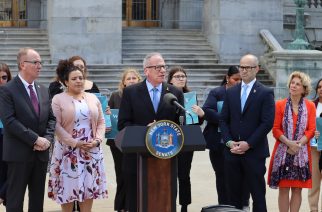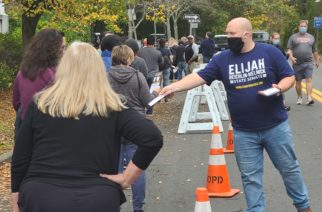
Katherine Carroll & Kintura Williams
Department of Education Commissioner MaryEllen Elia is asking state legislators to add $1.4 billion to the proposed education budget, which falls short of what the Board of Regents had requested.
During her testimony at a recent budget hearing, Elia emphasized the need for continued teacher development, a truly universal statewide Pre-K program, and increased funding for community schools to help foster a productive learning environment for students who may face issues of hunger, medical needs and distractions at home.
Gov. Andrew Cuomo announced plans to increase state spending on education next fiscal year by almost $1 billion. The Board of Regents is requesting a $2.4 billion increase.
 The Board of Regents has proposed $45 million for professional development for teachers and principals, in hopes of creating development teams that would tend to local district needs specifically. The Common Core task force found in a December report the need for ongoing professional development during the transition to higher educational standards. “$60 billion a year is invested in education,” Elia said. “We are accountable for that investment.”
The Board of Regents has proposed $45 million for professional development for teachers and principals, in hopes of creating development teams that would tend to local district needs specifically. The Common Core task force found in a December report the need for ongoing professional development during the transition to higher educational standards. “$60 billion a year is invested in education,” Elia said. “We are accountable for that investment.”
Instead of accepting Cuomo’s proposal to implement a new pre-K program — which would be the seventh different program in the state — Elia suggested the state invest $125 million over the next two fiscal years to create a universal pre-K. The proposed program would bring all of the distinct programs together under one shared collection of educational requirements and funding streams. Elia also suggested prioritizing pre-kindergarten programs for all four-year-olds across the state before expanding to include three-year-olds, as some districts in New York have yet to do.
Another goal of the budget proposal included investing in community schools; schools that provide more social and psychological services on top of educational and after school programs.
By providing meals, health and social support, youth development activities, and family engagement, community schools create a new kind of learning environment for students. Elia believes these schools create more opportunities for students to excel.
“Students have to feel connected, they have to have teachers that know who they are,” Elia said. “Professionals that know their families and their issues help them to stay engaged in learning.”
In addition to a proposed $100 million for community schools, the Board of Regents is also calling for $25 million over two years to develop a program aimed at improving educational outcomes for young men of color. Also known as the “My Brother’s Keeper” initiative, these programs would help eliminate gaps in opportunity for boys and young men of color by providing after school services.
Assemblyman Walter Mosley of Brooklyn, excited at the implementation of this initiative, discussed how this plan would make New York a pioneer. “My son goes to a public school, but we’re very lucky he goes to a blue ribbon school. There are more students who are not going to blue ribbon schools,” Mosley said. “We need to make investments in order to improve young men of color’s outcomes.”
With this proposed investment in both community schools and the My Brother’s Keeper initiative, schools would be able to potentially open on Saturdays and stay open later, making time for extra help and standardized test preparation. The initiative calls for hiring more minority teachers to help foster a sense of community in particular areas.
Elia also alerted the lawmakers to some upcoming changes in standardized testing. According to Elia, all assessments for students in grades three through eight have been shortened and, with the help of teachers, will be adjusted to better fit local curriculums.
In addition, students who are still “working productively” on the exams past the designated time limit will not have their tests taken away from them. The Board of Regents also hopes to implement project-based assessments as a means of testing for those students who perform better outside of a traditional testing environment. Accessibility to native language testing for English language learner students will also be expanded.
Questions arose from legislators about what they called excessive spending in several areas. Sen. John Bonacic, R-Mount Hope, asked what can be done to eliminate the $20 million being spent on salaries of teachers waiting in reassignment centers or “rubber rooms” for their misconduct hearings. Bonacic held up a New York City tabloid with a photo of a teacher sleeping on the floor of a “rubber room,” calling the entire process a “disservice to good teachers.”
Elia responded by reiterating the need for professional staff development to “make sure that the people in front of our students every day are trained and appropriate in what they are doing.”









